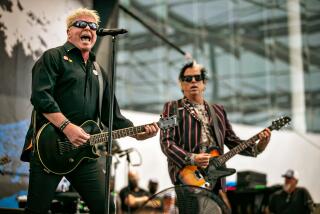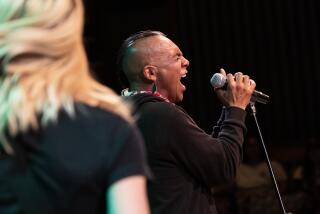Audioslave courts greatness
- Share via
With the release of its debut album in November, Audioslave was a very good hard-rock band halfway along the road to being a great one.
In a triumphant homecoming concert Monday at the Hollywood Palladium, the quartet showed it has made huge strides in closing that gap.
Playing with liberating punch, Audioslave exhibited collision-force urgency that shattered the sometimes too-polite boundaries of the group’s self-titled album.
Equally important, Audio- slave seems like a real team now, not the separate entities who came together after the demise of the members’ prized earlier bands (political rap-rockers Rage Against the Machine and introspective grunge kingpins Soundgarden) in the hopes that their contrasting styles could eventually merge.
One breakthrough Monday came when Chris Cornell, the darkly handsome singer who has been called the Brad Pitt of rock, picked up an acoustic guitar for a spirited solo version of “(What’s So Funny ‘Bout) Peace, Love and Understanding,” the Nick Lowe song popularized in 1979 by Elvis Costello.
The significance wasn’t so much which side Cornell took on a night when President Bush set the stage for war by giving Saddam Hussein 48 hours to get out of Dodge but the fact that he felt comfortable making any kind of political statement.
When the former Sound- garden leader joined three Rage Against the Machine alums two years ago, Cornell stressed that he had no intention of writing politically motivated lyrics a la former Rage frontman Zack de la Rocha.
True enough. There’s such an absence of social comment in the Audioslave album that any Rage fans wanting a political component in the new group had to settle for a song title, “Cochise.”
Despite the reference to the famous Apache who led his people against the white colonization of his homeland in the 1860s, Cornell’s lyric for the song tended, as usual, to focus on internal insecurities and doubts. In fact, the song warns against looking to him as a spokesman: “I am not a martyr, I am not a prophet.”
The political climate could have led to a showdown if Cornell felt that any political comment was a concession to the old Rage soapbox. But he seemed like a brother in arms on Monday, a great sign for the stability of the quartet, which had long been in question given the high-profile breakups of Rage and Soundgarden and the strong personalities of the principals.
Cornell’s acoustic number wasn’t the only sign of protest during the nearly 90-minute set, which included all but two of the 14 songs from “Audioslave.” A large peace sign was showcased prominently on the curtain behind the band, and a handwritten sign on stage read, “How Many Iraqis Per Gallon?”
The concert itself was a dazzling sonic excursion that showcased the richness of talent in this group, which also includes former Ragers Tom Morello on guitar, Tim Commerford on bass and Brad Wilk on drums.
Few rock bands have ever had two calling cards as strong as Cornell, whose brooding vocals convey internal frustration and pain with extraordinary conviction, and Morello, whose guitar work is consistently inventive and fresh. Although we often hear about those who can make their guitars sing, Morello also makes his cry, scream, rap and rejoice. It gives a therapeutic, uplifting edge to even the band’s darkest musical instincts.
In inducting the Clash into the Rock and Roll Hall of Fame last week in New York, Morello praised that punk outfit as one of the few bands that mattered during its time. On Monday, he and the rest of Audioslave showed this is a band that matters today.
The remaining challenge rests in the songwriting. Audio- slave, which will be part of the Lollapalooza tour lineup this summer, has a few winning numbers, including “Like a Stone” and “Shadow on the Sun,” but too many of the songs rely on the band’s vocal and instrumental talents. In putting together their first album, the musicians were simply trying to connect with each other. Next time out, they need to focus on better connecting with the rest of us with songs that speak with more clarity and eloquence.
More to Read
The biggest entertainment stories
Get our big stories about Hollywood, film, television, music, arts, culture and more right in your inbox as soon as they publish.
You may occasionally receive promotional content from the Los Angeles Times.










